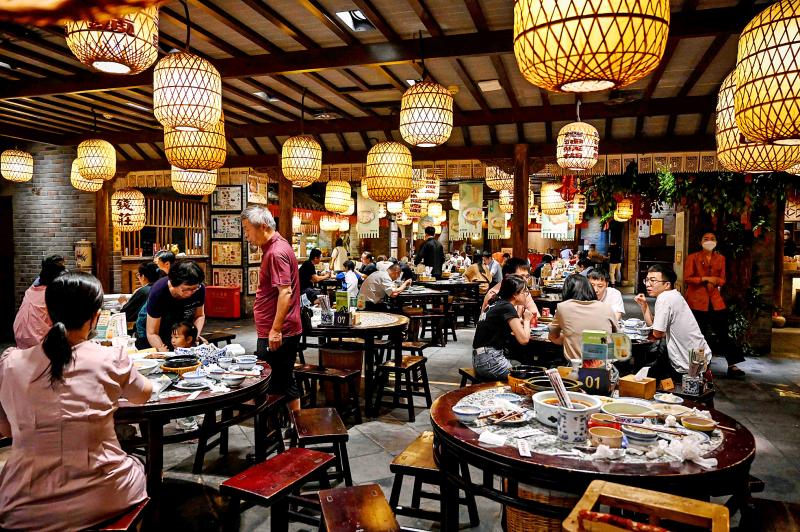China’s services activity contracted more than expected last month, with spending figures over the long weekend showing that a hit to consumer spending from COVID-19 curbs could linger through this month.
The Caixin China Services purchasing managers’ index (PMI) rose to 41.4 last month from 36.2 in the previous month, Caixin and S&P Global said in a statement yesterday, missing the median estimate of 46 in a Bloomberg survey of economists.
A reading below 50 signals a contraction.

Photo: AFP
COVID-19 restrictions in major Chinese cities began easing last month as case numbers dropped, raising hopes of a pickup from the worst activity levels since early 2020. Shanghai began lifting its two-month long lockdown last week and Beijing has rolled back restrictions as well.
However, the road to recovery could be a long and bumpy one, with regular COVID-19 testing becoming the norm and some controls remaining in place.
Figures from the three-day Dragon Boat Festival from Friday last week showed spending remains depressed.
Domestic tourism revenue dropped 12.2 percent from a year ago, while the number of trips made was down 10.7 percent, data from the Chinese Ministry of Culture and Tourism showed.
China’s service industries posted further declines in business and new orders last month, the PMI statement said.
“May’s reading was the
second-lowest since February 2020, as China’s COVID-19 epidemic still weighed heavily on services activities,” Caixin Insight Group (財新智庫) senior economist Wang Zhe (王?) said in a statement.
“Entrepreneurs overall were still confident that the COVID-19 epidemic will be brought under control, though some remained concerned about a resurgence of COVID-19 in the future,” he said.
Citigroup Inc economists said the drop in travel and spending over the long weekend was smaller compared with those seen during the Workers’ Day holiday last month, which suggest a recovery is under way.
The improvement will likely accelerate from this month onward, they said.
The Caixin survey findings are largely in line with those in the official non-manufacturing purchasing managers’ index, which increased to 47.8 from April’s 41.9, but stayed below the cutoff 50 mark.
The official survey tracks larger companies and includes the construction sector, while the Caixin survey focuses more on smaller ones.

MULTIFACETED: A task force has analyzed possible scenarios and created responses to assist domestic industries in dealing with US tariffs, the economics minister said The Executive Yuan is tomorrow to announce countermeasures to US President Donald Trump’s planned reciprocal tariffs, although the details of the plan would not be made public until Monday next week, Minister of Economic Affairs J.W. Kuo (郭智輝) said yesterday. The Cabinet established an economic and trade task force in November last year to deal with US trade and tariff related issues, Kuo told reporters outside the legislature in Taipei. The task force has been analyzing and evaluating all kinds of scenarios to identify suitable responses and determine how best to assist domestic industries in managing the effects of Trump’s tariffs, he

TIGHT-LIPPED: UMC said it had no merger plans at the moment, after Nikkei Asia reported that the firm and GlobalFoundries were considering restarting merger talks United Microelectronics Corp (UMC, 聯電), the world’s No. 4 contract chipmaker, yesterday launched a new US$5 billion 12-inch chip factory in Singapore as part of its latest effort to diversify its manufacturing footprint amid growing geopolitical risks. The new factory, adjacent to UMC’s existing Singapore fab in the Pasir Res Wafer Fab Park, is scheduled to enter volume production next year, utilizing mature 22-nanometer and 28-nanometer process technologies, UMC said in a statement. The company plans to invest US$5 billion during the first phase of the new fab, which would have an installed capacity of 30,000 12-inch wafers per month, it said. The

Taiwan’s official purchasing managers’ index (PMI) last month rose 0.2 percentage points to 54.2, in a second consecutive month of expansion, thanks to front-loading demand intended to avoid potential US tariff hikes, the Chung-Hua Institution for Economic Research (CIER, 中華經濟研究院) said yesterday. While short-term demand appeared robust, uncertainties rose due to US President Donald Trump’s unpredictable trade policy, CIER president Lien Hsien-ming (連賢明) told a news conference in Taipei. Taiwan’s economy this year would be characterized by high-level fluctuations and the volatility would be wilder than most expect, Lien said Demand for electronics, particularly semiconductors, continues to benefit from US technology giants’ effort

‘SWASTICAR’: Tesla CEO Elon Musk’s close association with Donald Trump has prompted opponents to brand him a ‘Nazi’ and resulted in a dramatic drop in sales Demonstrators descended on Tesla Inc dealerships across the US, and in Europe and Canada on Saturday to protest company chief Elon Musk, who has amassed extraordinary power as a top adviser to US President Donald Trump. Waving signs with messages such as “Musk is stealing our money” and “Reclaim our country,” the protests largely took place peacefully following fiery episodes of vandalism on Tesla vehicles, dealerships and other facilities in recent weeks that US officials have denounced as terrorism. Hundreds rallied on Saturday outside the Tesla dealership in Manhattan. Some blasted Musk, the world’s richest man, while others demanded the shuttering of his